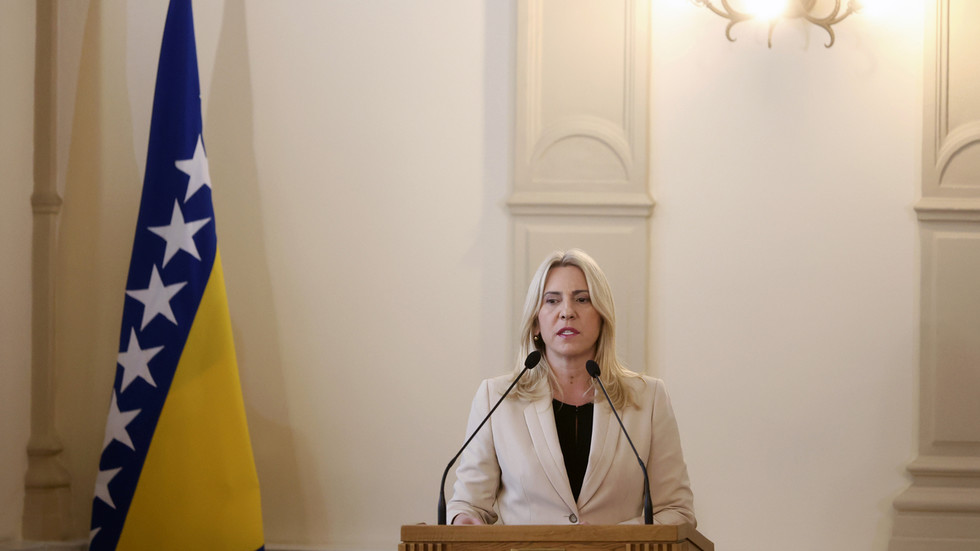
Claims that Bosnia-Herzegovina had joined the EU embargo are false, the country’s president has clarified
FILE PHOTO: Bosnian Serb member of the tripartite Bosnian Presidency Zeljka Cvijanovic addresses media in Sarajevo, Bosnia, November 16, 2022 © AP / Armin Durgut
Bosnia-Herzegovina has not imposed sanctions against Russia over the Ukraine conflict, leaders of the Bosnian Serbs said on Tuesday, accusing an opposition party leader who claimed otherwise of making things up.
“Such a decision does not exist,” said Zeljka Cvijanovic, the current chair of the tripartite Presidency of Bosnia-Herzegovina and a representative of Republika Srpska (RS), the Serb half of the country.
Cvijanovic noted that no government body with the authority to make a decision on sanctions had done so. According to her, EU foreign policy commissioner Josep Borrell has repeatedly asked when Bosnia would join the bloc’s sanctions against Moscow.
“He wouldn’t have asked if we had already done so,” she told reporters in the RS capital of Banja Luka on Tuesday.
“I see some people here believe Brussels more than our government officials,” said RS President Milorad Dodik. While Bosnia’s Muslim and Croat communities may favor siding with the EU and NATO, Dodik noted, the constitution requires such decisions to be made through consensus, and the Serbs are firmly opposed.
Cvijanovic and Dodik were commenting on claims by opposition politician Branislav Borenovic that Bosnia had in fact already joined the EU sanctions. Borenovic, who leads the Party of Democratic Progress (PDP), told the public broadcaster RTRS on Sunday that Borrell had informed him of the existence of 53 statements and decisions by which Sarajevo had accepted all 10 packages of EU sanctions against Moscow.
“The response was very clear: Bosnia-Herzegovina had joined the EU sanctions on Russia,” Borenovic claimed.
The Russian embassy in Sarajevo maintains that this is fake news. “Without a decision of the presidency, any steps by individual diplomats or politicians in this respect are null and void,” the embassy told RTRS. Ambassador Igor Kalabukhov added that violating the consensus required by the constitution undermined the Dayton Peace Accords.
The 1995 treaty ended the civil war between Bosnia’s Serbs, Croats and Muslims. One of its annexes was the new constitution, which recognized the Serb republic and the Muslim-Croat federation as two equal entities.
Dodik has filed a lawsuit against Bosnia’s ambassador to the UN, Sven Alkalaj, accusing him of overstepping his authority when he voted to condemn Russia in February. The Bosnian Serb leader said at the time that renegade diplomats did not represent the country’s official position, and that the RS was proud of its good relations with Moscow.




